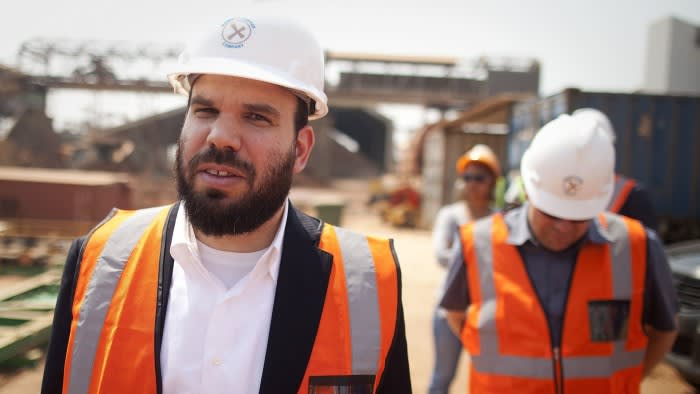The US tried to facilitate a deal for Swiss trading house Mercuria to acquire copper-cobalt mines in the Democratic Republic of Congo in a transaction that hinged on Washington lifting sanctions against controversial Israeli billionaire Dan Gertler.
The unusual US initiative, spearheaded by President Joe Biden’s senior energy adviser Amos Hochstein, reflects the increasingly fierce competition between the US and China for access to the minerals needed for clean energy infrastructure.
Geneva-based Mercuria was among companies identified by the US State Department as a potential buyer for the mines. It held talks last year with the current owner, Kazakh-controlled Eurasian Resources Group, said four people with knowledge of the discussions.
The US government has rarely intervened in international mining projects so directly, but President Joe Biden’s administration has made access to critical metals a foreign policy priority.
China already has a dominant position in the mining and processing of many metals, particularly cobalt, and several Chinese companies have previously expressed interest in acquiring ERG’s Congolese mines.
Under one of the proposals discussed last year, Mercuria would have acquired all of ERG’s projects in the country, except its oldest project Boss Mining. But the parties could not agree on the value of the assets, particularly given the falling price of cobalt, the people said. Prices have halved to $16.5 a pound in the past two years.
The US would still like to facilitate a sale to a US-friendly buyer and a future deal with Mercuria is not off the table, two of the people said.
Improved US access to copper and cobalt is deemed so important that the Biden administration is proposing to lift its restrictions against Gertler in order to facilitate a sale.
Gertler was hit with sanctions by the US Treasury in 2017 for alleged corrupt dealing in Congo, but retains royalty streams from three mines, including ERG’s Metalkol. US officials say this has made it difficult for US-friendly companies to invest, as they are concerned about legal risks.
Under the proposed agreement with Gertler, the US would grant him licences to sell the royalty streams and any other assets back to the Congolese government for at least $300mn. It would then restore his access to the US financial system once he has relinquished all his investments in Congo, the FT has reported.
The Gertler proposal has provoked criticism from civil society groups and at least four US lawmakers, who warned in May that lifting the restrictions in a deal that further enriched the billionaire would undermine the credibility of the US sanctions regime.
Anneke Van Woudenberg, executive director at the non-profit group RAID, which has tracked the Gertler case, questioned why the US was still considering lifting the sanctions if there was no immediate opportunity for a US-friendly company to acquire the mines.
“It’s hard to see who benefits from this deal to ease sanctions, apart from Mr Gertler,” she said.
US officials believe, however, that the Gertler proposal has already resulted in new supply contracts between the ERG mines and western buyers, who were now less concerned about the risks of dealing with the projects given the evidence of US engagement.
The US state department, Mercuria, ERG and Gertler, who has consistently denied any wrongdoing, declined to comment.
Mercuria was founded in 2004 by former Goldman Sachs traders Marco Dunand and Daniel Jaeggi, and has grown into one of the world’s biggest commodity traders. The company is expanding into metals after hiring Kostas Bintas, who was a star copper trader at rival Trafigura.
Unlike European rivals Glencore, Trafigura, Vitol and Gunvor, Mercuria has not previously faced corruption charges from the US justice department, making it a more obvious partner for Washington.
To facilitate a future deal to acquire the Congolese mines, either for Mercuria or another party, the US government will need both to end Gertler’s involvement with Metalkol and to encourage ERG’s shareholders to sell the assets, said one of the people involved.
Kazakh oligarchs Alexander Mashkevich and Patokh Chodiev each own 20 per cent of Luxembourg-registered ERG; another 20 per cent is owned by the heirs to the late oligarch Alijan Ibragimov. The remaining 40 per cent is held by the Kazakh state.
The Kazakh owners have considered selling the Congolese mines on several occasions since at least 2017, in part because of challenges in accessing western financing for the projects.
That has proved difficult because of Gertler’s continued ties with Metalkol and legacy corruption allegations that were made regarding the acquisition of the mines over a decade ago by ERG’s subsidiary ENRC. The UK’s Serious Fraud Office dropped a 10-year investigation into the deals last year.
That decision eased one of the hurdles to a potential transaction but also made it easier for ERG to access new financing, reducing some of the financial pressure on the owners to sell, said one of the people familiar with the situation.
Anglo American was also asked by US officials in 2022 to consider acquiring some of ERG’s mines, but the talks did not progress as far as those with Mercuria, according to two people familiar with the discussions.


